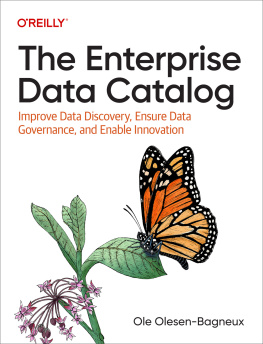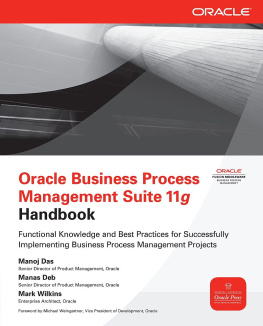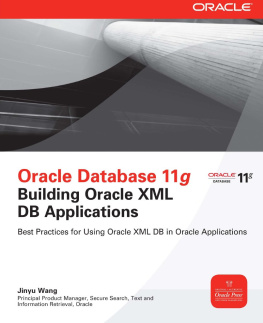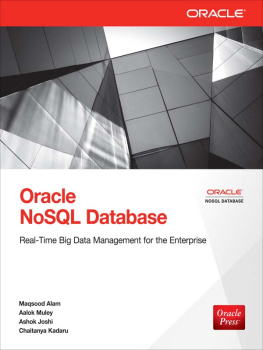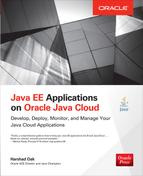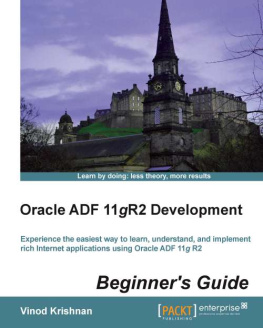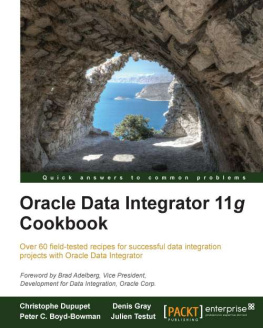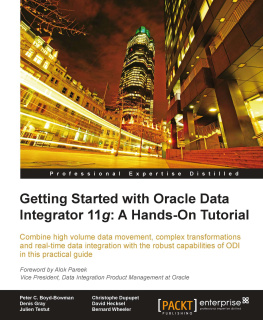Copyright 2015 by McGraw-Hill Education. All rights reserved. Except as permitted under the United States Copyright Act of 1976, no part of this publication may be reproduced or distributed in any form or by any means, or stored in a database or retrieval system, without the prior written permission of the publisher, with the exception that the program listings may be entered, stored, and executed in a computer system, but they may not be reproduced for publication.
ISBN: 978-0-07-183319-6
MHID: 0-07-183319-6
The material in this eBook also appears in the print version of this title: ISBN: 978-0-07-183318-9, MHID: 0-07-183318-8.
eBook conversion by codeMantra
Version 1.0
All trademarks are trademarks of their respective owners. Rather than put a trademark symbol after every occurrence of a trademarked name, we use names in an editorial fashion only, and to the benefit of the trademark owner, with no intention of infringement of the trademark. Where such designations appear in this book, they have been printed with initial caps.
McGraw-Hill Education eBooks are available at special quantity discounts to use as premiums and sales promotions, or for use in corporate training programs. To contact a representative please visit the Contact Us page at www.mhprofessional.com.
Oracle and Java are registered trademarks of Oracle Corporation and/or its affiliates. All other trademarks are the property of their respective owners, and McGraw-Hill Education makes no claim of ownership by the mention of products that contain these marks.
Screen displays of copyrighted Oracle software programs have been reproduced herein with the permission of Oracle Corporation and/or its affiliates.
Information has been obtained by Publisher from sources believed to be reliable. However, because of the possibility of human or mechanical error by our sources, Publisher, or others, Publisher does not guarantee to the accuracy, adequacy, or completeness of any information included in this work and is not responsible for any errors or omissions or the results obtained from the use of such information.
Oracle Corporation does not make any representations or warranties as to the accuracy, adequacy, or completeness of any information contained in this Work, and is not responsible for any errors or omissions.
TERMS OF USE
This is a copyrighted work and McGraw-Hill Education and its licensors reserve all rights in and to the work. Use of this work is subject to these terms. Except as permitted under the Copyright Act of 1976 and the right to store and retrieve one copy of the work, you may not decompile, disassemble, reverse engineer, reproduce, modify, create derivative works based upon, transmit, distribute, disseminate, sell, publish or sublicense the work or any part of it without McGraw-Hill Educations prior consent. You may use the work for your own noncommercial and personal use; any other use of the work is strictly prohibited. Your right to use the work may be terminated if you fail to comply with these terms.
THE WORK IS PROVIDED AS IS. McGRAW-HILL EDUCATION AND ITS LICENSORS MAKE NO GUARANTEES OR WARRANTIES AS TO THE ACCURACY, ADEQUACY OR COMPLETENESS OF OR RESULTS TO BE OBTAINED FROM USING THE WORK, INCLUDING ANY INFORMATION THAT CAN BE ACCESSED THROUGH THE WORK VIA HYPERLINK OR OTHERWISE, AND EXPRESSLY DISCLAIM ANY WARRANTY, EXPRESS OR IMPLIED, INCLUDING BUT NOT LIMITED TO IMPLIED WARRANTIES OF MERCHANTABILITY OR FITNESS FOR A PARTICULAR PURPOSE. McGraw-Hill Education and its licensors do not warrant or guarantee that the functions contained in the work will meet your requirements or that its operation will be uninterrupted or error free. Neither McGraw-Hill Education nor its licensors shall be liable to you or anyone else for any inaccuracy, error or omission, regardless of cause, in the work or for any damages resulting therefrom. McGraw-Hill Education has no responsibility for the content of any information accessed through the work. Under no circumstances shall McGraw-Hill Education and/or its licensors be liable for any indirect, incidental, special, punitive, consequential or similar damages that result from the use of or inability to use the work, even if any of them has been advised of the possibility of such damages. This limitation of liability shall apply to any claim or cause whatsoever whether such claim or cause arises in contract, tort or otherwise.
We want to dedicate this book to our families and friends,
who have supported and inspired us to achieve higher,
both professionally and personally.
About the Authors
Helen Sun, Ph.D., is the coauthor of Oracle Big Data Handbook, writing chapters on Endeca and big data architecture development. She has written one of the most downloaded white papers on big data (along with numerous other white papers on information architecture and data governance). Helen is the lead author of Oracle Information Architecture and Framework and has spoken at various industry events, including as a keynote speaker at Open Groups World Conference on Big Data and Oracle OpenWorld. Helen is one of the most distinguished Oracle enterprise architects, and her main role is to assist CIOs and CTOs of Fortune 500 companies in architecture and transformations. She is a highly regarded thought leader in information and big data architecture, leveraging Oracles most comprehensive business analytics portfolio, including Endeca Information Discovery and other Oracle Big Data solution sets. She regularly performs education and design sessions with Oracle customers on Endeca and analytics with real-world expertise on implementing business analytics using Endeca for a variety of industries, including financial services, healthcare, research, manufacturing, retail, consumer packaged goods (CGP), and the public sector.
William Smith has more than two decades of experience as an enterprise architect with a strong background in decision support systems and analytics. Williams early career experience includes working with data from manufacturing control systems and instrumentation in industries such as plastics, petro-chemicals, glass, food, and extrusion processes. William has enterprise systems experience in higher education, finance, consumer research, and healthcare. In the area of analytics, William has worked in the area of predictive failures and statistical process control. William is currently working with customers making use of big data and is developing innovative solutions utilizing Endeca. Williams role as an enterprise architect extends into engineered systems, where he was an early adopter of Oracle-engineered systems and is now working to develop engineered systems targeted at specific applications and markets.
About the Technical Editors
Tom Plunkett is the lead author of Oracle Big Data Handbook and other books. Tom is a principal consultant with Oracle and also teaches graduate-level computer science courses for Virginia Tech. Tom is also the chief data officer for AtrocityWatch, a nonprofit organization that uses big data to analyze social media to detect precursors to atrocities. Tom has given presentations on big data at more than 50 conferences. Prior to joining Oracle, Tom practiced patent law with Fliesler Meyer in San Francisco, representing Oracle and other Silicon Valley companies. Tom has a B.A. and J.D. from George Mason University, has an M.S. in computer science from Virginia Tech, and has completed graduate coursework in management science and engineering from Stanford University.


